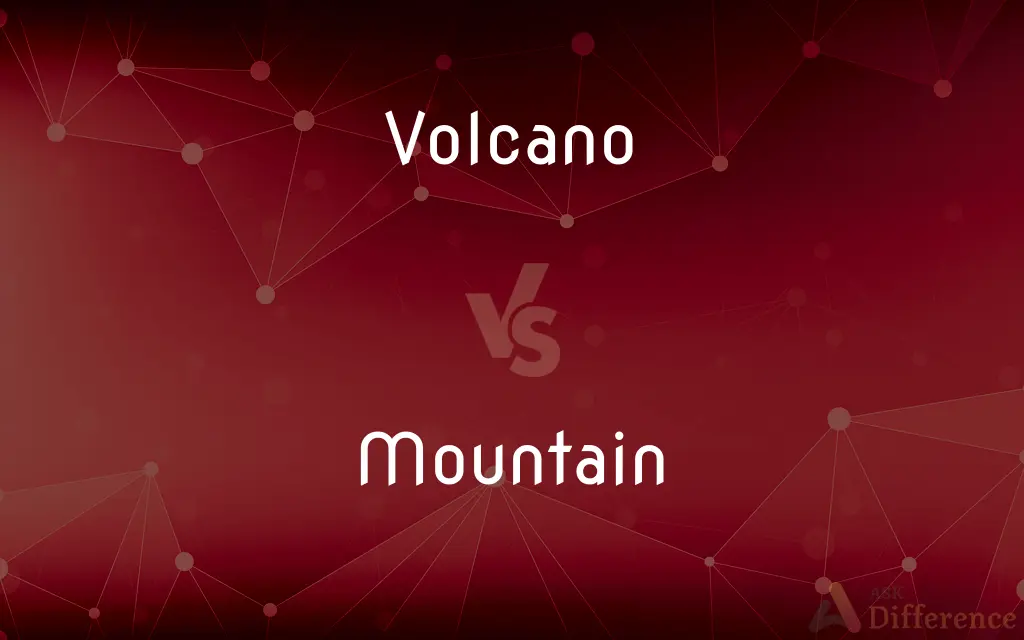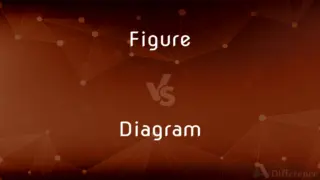Volcano vs. Mountain — What's the Difference?
By Tayyaba Rehman & Fiza Rafique — Updated on September 16, 2023

Difference Between Volcano and Mountain
Table of Contents
ADVERTISEMENT
Key Differences
A "Volcano" is a geological formation characterized by a vent in the Earth's crust through which molten rock, ash, and gases can be expelled. It's not just a mountain; it's a mountain with a plumbing system connected to the molten interior of the Earth. On the other hand, a "Mountain" is a landform that rises significantly above its surrounding terrain, formed by tectonic forces or volcanic activity, but lacking the vent system that characterizes volcanoes.
The word "Volcano" almost always implies the potential for a dramatic event: an eruption. In contrast, the term "Mountain" is more neutral, signifying a prominent landform without any inherent implication of eruptive activity. While all volcanoes are technically mountains, not all mountains are volcanoes.
From a grammatical standpoint, both "Volcano" and "Mountain" are countable nouns. You can say, "There are several volcanoes in this region," or "There are many mountains in this range." However, "Volcano" usually carries a more specialized, scientific context in conversation, whereas "Mountain" is a more general term.
Interestingly, some mountains may have once been volcanoes but are no longer active and are thus not referred to as volcanoes. In summary, while all volcanoes are mountains due to their elevated structure, not all mountains are volcanoes because they lack the specialized vent system and the ability to erupt.
Comparison Chart
Meaning
Mountain with an opening that can erupt
Elevated landform
ADVERTISEMENT
Activity
Can erupt
Does not erupt
Formation
Tectonic activity and magma
Tectonic activity
Grammatical Role
Countable noun
Countable noun
Context
More specialized, scientific
More general
Compare with Definitions
Volcano
A mountain that can erupt with lava and gases.
The volcano erupted suddenly, causing evacuations.
Mountain
A large, natural elevation of the Earth's surface.
The mountain offers breathtaking views.
Volcano
A vent for molten rock and gases.
The volcano has been active for centuries.
Mountain
An elevated area created by tectonic forces.
The mountain is millions of years old.
Volcano
A geological feature formed by tectonic and volcanic activity.
The volcano is part of a larger geological system.
Mountain
A landform that rises prominently above its surroundings.
The mountain has a well-worn hiking trail.
Volcano
A mountainous vent in Earth's crust.
The volcano is closely monitored for signs of activity.
Mountain
A high point in a geographical area.
The mountain can be seen from miles away.
Volcano
A volcano is a rupture in the crust of a planetary-mass object, such as Earth, that allows hot lava, volcanic ash, and gases to escape from a magma chamber below the surface. On Earth, volcanoes are most often found where tectonic plates are diverging or converging, and most are found underwater.
Mountain
A steeply rising landform.
The mountain is a challenging climb.
Volcano
An opening in Earth's crust.
Magma flows from the volcano during an eruption.
Mountain
A mountain is an elevated portion of the Earth's crust, generally with steep sides that show significant exposed bedrock. A mountain differs from a plateau in having a limited summit area, and is larger than a hill, typically rising at least 300 metres (1000 feet) above the surrounding land.
Volcano
An opening in the earth's crust from which lava, ash, and hot gases flow or are ejected during an eruption.
Mountain
Abbr. Mt. or Mtn. A natural elevation of the earth's surface having considerable mass, generally steep sides, and a height greater than that of a hill.
Volcano
A similar opening on the surface of another celestial object.
Mountain
A large heap
A mountain of laundry.
Volcano
A usually cone-shaped mountain formed from the materials issuing from such an opening.
Mountain
A huge quantity
A mountain of trouble.
Volcano
A vent or fissure on the surface of a planet (usually in a mountainous form) with a magma chamber attached to the mantle of a planet or moon, periodically erupting forth lava and volcanic gases onto the surface.
Iceland's volcanoes are among the most active on Earth.
Mountain
(countable) An elevation of land of considerable dimensions rising more or less abruptly, forming a conspicuous figure in the landscape, usually having a small extent of surface at its summit.
Everest is the highest mountain in the world.
We spent the weekend hiking in the mountains.
Volcano
A kind of firework producing an upward plume of sparks.
Mountain
(countable) Something very large in size or quantity; a huge amount; a great heap.
He was a real mountain of a man, standing seven feet tall.
There's still a mountain of work to do.
Volcano
To erupt; to burst forth
Mountain
(figuratively) A difficult task or challenge.
Volcano
A mountain or hill, usually more or less conical in form, from which lava, cinders, steam, sulphur gases, and the like, are ejected; - often popularly called a burning mountain.
Mountain
Wine from Malaga made from grapes that grow on a mountain.
Volcano
A fissure in the earth's crust (or in the surface of some other planet) through which molten lava and gases erupt
Mountain
A woman's large breast.
Volcano
A mountain formed by volcanic material
Mountain
(cartomancy) The twenty-first Lenormand card.
Mountain
A large mass of earth and rock, rising above the common level of the earth or adjacent land; earth and rock forming an isolated peak or a ridge; an eminence higher than a hill; a mount.
Mountain
A range, chain, or group of such elevations; as, the White Mountains.
Mountain
A mountainlike mass; something of great bulk; a large quantity.
I should have been a mountain of mummy.
Mountain
Of or pertaining to a mountain or mountains; growing or living on a mountain; found on or peculiar to mountains; among mountains; as, a mountain torrent; mountain pines; mountain goats; mountain air; mountain howitzer.
Mountain
Like a mountain; mountainous; vast; very great.
The high, the mountain majesty of worth.
Mountain
A land mass that projects well above its surroundings; higher than a hill
Mountain
A large number or amount;
Made lots of new friends
She amassed a mountain of newspapers
Mountain
Relating to or located in mountains;
Mountain people
Common Curiosities
How are Volcanoes formed?
Volcanoes are formed by the movement of tectonic plates and the rise of magma from below Earth's crust.
Are all Mountains Volcanoes?
No, not all mountains are volcanoes; many lack the vent system required for eruptions.
What is a Mountain?
A mountain is a large, natural elevation of the Earth's surface, rising prominently above its surroundings.
How are Mountains formed?
Mountains are primarily formed through tectonic forces and, in some cases, past volcanic activity.
Are all Volcanoes Mountains?
Yes, all volcanoes are technically mountains but with the capability to erupt.
Is Volcano a countable noun?
Yes, "volcano" is a countable noun. You can say, "There are several volcanoes in this region."
Do Mountains erupt?
No, mountains do not have the capability to erupt.
Can a Mountain become a Volcano?
Not typically, unless there is tectonic activity that creates a vent system.
What is a Volcano?
A volcano is a mountainous landform with a vent that can erupt, expelling lava and gases.
Is Mountain a countable noun?
Yes, "mountain" is also a countable noun.
Is Volcano more specialized than Mountain?
Yes, the term "volcano" generally implies a scientific or specialized context.
What's more dangerous, a Volcano or a Mountain?
Generally, a volcano poses more risks due to its ability to erupt.
Can a Volcano become a Mountain?
A volcano is already a mountain but can become inactive, essentially becoming just a mountain.
What do Volcanoes erupt?
Volcanoes can erupt lava, ash, and various gases.
Is Mountain a general term?
Yes, "mountain" is a more general term used to describe elevated landforms.
Share Your Discovery

Previous Comparison
Character vs. Characteristic
Next Comparison
Figure vs. DiagramAuthor Spotlight
Written by
Tayyaba RehmanTayyaba Rehman is a distinguished writer, currently serving as a primary contributor to askdifference.com. As a researcher in semantics and etymology, Tayyaba's passion for the complexity of languages and their distinctions has found a perfect home on the platform. Tayyaba delves into the intricacies of language, distinguishing between commonly confused words and phrases, thereby providing clarity for readers worldwide.
Co-written by
Fiza RafiqueFiza Rafique is a skilled content writer at AskDifference.com, where she meticulously refines and enhances written pieces. Drawing from her vast editorial expertise, Fiza ensures clarity, accuracy, and precision in every article. Passionate about language, she continually seeks to elevate the quality of content for readers worldwide.
















































